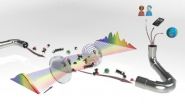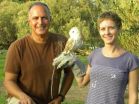Not all doctors follow cancer screening guidelines
New study highlights need to address both the overuse and underuse of recommended colorectal cancer screening tests
2010-10-15
(Press-News.org) Only one-fifth of primary care physicians in the US follow practice guidelines for colorectal cancer screening for all the tests they recommend, according to Dr. Robin Yabroff from the National Cancer Institute and her colleagues. About 40 percent followed guidelines for some of the tests they recommended and the remaining 40 percent did not follow guidelines for any of the screening tests they recommended. Furthermore, their analysis1 of physician screening recommendations for colorectal cancer shows that many clinicians either overuse or underuse screening. Their findings appear online in the Journal of General Internal Medicine², published by Springer.
The theory goes that having multiple options for screening allows physicians and patients to consider the risks, benefits and other attributes of colorectal cancer screening tests* to identify the option best suited to the patient. In reality, however, many adults in the US do not receive appropriate colorectal cancer screening.
To learn about colorectal cancer screening practice in the US, the authors surveyed 1,266 physicians who took part in a national survey conducted by the National Cancer Institute.
Although most physicians made guideline-consistent recommendations for initiating screening in average risk patients at age 50 and for screening intervals for individual tests, few (19 percent) made guideline-consistent recommendations for both screening initiation and screening intervals across all screening tests that they recommended. Those whose recommendations were guideline consistent tended to be younger and board certified. They were also more likely to use electronic medical records, take patients' screening preferences into account and be influenced by published clinical evidence.
Colonoscopy was the modality for which the highest proportion of physicians recommended screening more frequently than guidelines specify. It is also the most expensive colorectal screening method and the most commonly recommended. Overuse of screening may result in unnecessary follow-up testing for patients and increased risk of screening complications.
Some physicians recommended initiating screening in patients older than age 50 or at longer intervals than specified in the guidelines. Underuse of screening results in fewer earlier stage or pre-invasive cancers being detected.
Dr. Yabroff concludes: "Efforts to improve colorectal cancer screening practice should focus on factors that influence both overuse and underuse of screening and consider all recommended colorectal cancer screening modalities."
###
*Screening options include: fecal occult blood testing, flexible sigmoidoscopy, colonoscopy, and double contrast barium enema.
Reference
1. Yabroff KR et al (2010). Are physicians' recommendations for colorectal cancer screening guideline-consistent? Journal of General Internal Medicine; DOI 10.1007/s11606-010-1516-5
2. The Journal of General Internal Medicine is the official journal of the Society of General Internal Medicine.
The full-text article is available to journalists on request.
END
ELSE PRESS RELEASES FROM THIS DATE:
2010-10-15
Even Darwin was a self-admitted orchid lover. Dictionaries describe orchids as exotic ornamentals. Indeed, these plants – more than 30000 different species are thought to exist – are exotic due their extraordinary and diverse flower morphology. However, they are also exotic from a point of view other than beauty: as crafty imposters in order to achieve reproduction and to make sure that their ovaries are pollinated. Orchids depend on the assistance of pollinators, and like many other flowering plants, attract insects.
Epipactis veratrifolia, an orchid native in South ...
2010-10-15
WASHINGTON – Children whose mothers return to work before their offspring turn 3 are no more likely to have academic or behavioral problems than kids whose mothers stay at home, according to a review of 50 years of research.
"Overall, I think this shows women who go back to work soon after they have their children should not be too concerned about the effects their employment has on their children's long-term well-being," said psychologist Rachel Lucas-Thompson, PhD, lead author of the study conducted with Drs. JoAnn Prause and Wendy Goldberg at the University of California, ...
2010-10-15
COLUMBUS, Ohio – People who believe false rumors about the proposed Islamic cultural center and mosque near Ground Zero in New York City not only are more likely to oppose that project – they are more likely to oppose building of a mosque in their own neighborhood.
Researchers surveyed 750 Americans and asked them if they believed any of four rumors associated with the New York City mosque, all of which have been refuted. One of the rumors, for example, falsely says that that the proposed center is scheduled to open on September 11, 2011 in celebration of the 10-year ...
2010-10-15
New Haven, Conn.—Sixty-three percent of Americans believe that global warming is happening, but many do not understand why, according to a national study conducted by researchers at Yale University.
The report titled "Americans' Knowledge of Climate Change" found that only 57 percent know what the greenhouse effect is, only 45 percent of Americans understand that carbon dioxide traps heat from the Earth's surface, and just 50 percent understand that global warming is caused mostly by human activities. Large majorities incorrectly think that the hole in the ozone layer ...
2010-10-15
Scientists at JILA and collaborators have demonstrated an improved laser-based "molecular fingerprinting" technique that picks out traces of key hydrogen-containing and other molecules from a billion other particles in a gas in just 30 seconds or less—performance suitable for breathalyzers for diagnosing disease, measuring trace gases in the atmosphere, detecting security threats and other applications.
JILA is jointly operated by the National Institute of Standards and Technology (NIST) and University of Colorado at Boulder (CU).
Described in Optics Express,* the research ...
2010-10-15
PHILADELPHIA — An article published in the Ffall 2010 issue of CR, the AACR's magazine for cancer survivors and their families and caregivers, details the immense challenges faced by those who suffer with cancer and lack the necessary resources for proper treatment and care — the homeless.
CR magazine contributing writer Cynthia Ryan, Ph.D., who is an associate professor of English at the University of Alabama at Birmingham, took to the streets over the last year to offer a glimpse into the lives of homeless cancer patients struggling to obtain treatment while being ...
2010-10-15
BUFFALO, N.Y. -- Cyber attacks of various sorts have been around for decades. The most recent, and very dangerous, escalation in the past few years has been marked by countries launching attacks against other nations, such as Stuxnet, the nuclear plant-disrupting worm the Iranians have blamed on Israel and the U.S., while others are pointing the finger at Russia.
University at Buffalo military ethicist Randall R. Dipert, PhD, one of the founders of the National Center for Ontological Research at UB, says we have good reason to worry, because cyber attacks are almost ...
2010-10-15
Anxiety, or the reaction to a perceived danger, is a response that differs from one animal or human to another ― or so scientists thought. Now researchers at Tel Aviv University are challenging what we know about stress, and their study has implications for helping clinicians better treat victims of terrorism or natural disasters.
Prof. David Eilam and his graduate student Rony Izhar of Tel Aviv University's Department of Zoology are spearheading a study designed to investigate the anxieties experienced by an entire social group. Using the natural predator-and-prey ...
2010-10-15
Researchers from the National Institute of Standards and Technology (NIST) and the German national metrology institute have used NIST's miniature atom-based magnetic sensor to successfully track a human heartbeat, confirming the device's potential for biomedical applications.
Described in Applied Physics Letters,* the study is the first to be performed under conditions resembling a clinical setting with the NIST mini-sensors, which until now have been operated mostly in physics laboratories. The new experiments were carried out at the Physikalisch Technische Bundesanstalt ...
2010-10-15
TORONTO, ON – Evolutionary biologists at the University of Toronto (U of T) have found that environment plays a key role in determining whether a species opts for sexual over asexual reproduction.
The study, led by post-doctoral student Lutz Becks and Professor Aneil Agrawal of the Department of Ecology & Evolutionary Biology, found that species that inhabit spatially heterogenous environments – habitats characterized by uneven concentrations of its own species among a rich variety of other animals and plants – had higher rates of sexual reproduction than those in more ...
LAST 30 PRESS RELEASES:
[Press-News.org] Not all doctors follow cancer screening guidelines
New study highlights need to address both the overuse and underuse of recommended colorectal cancer screening tests



